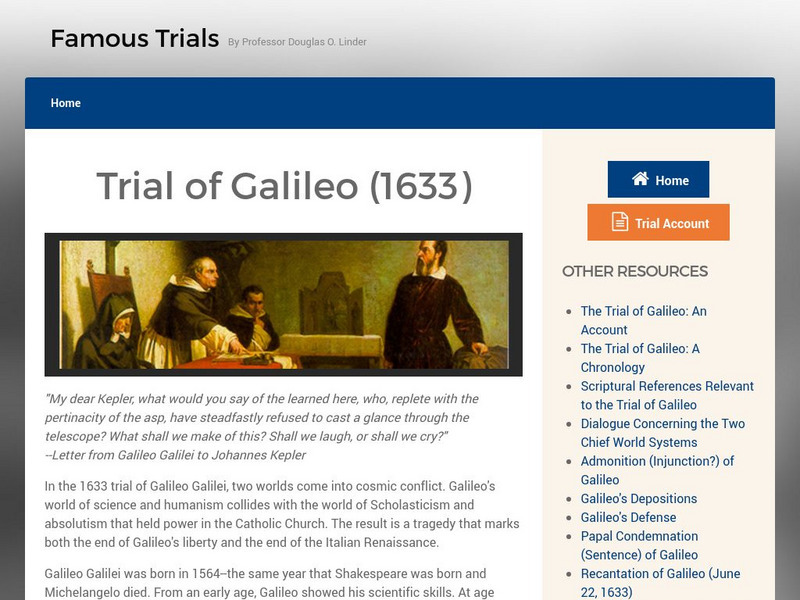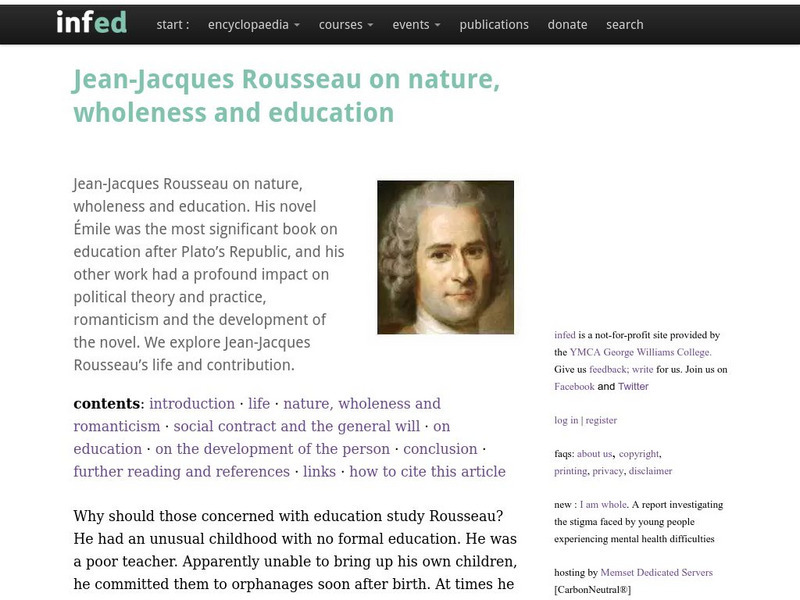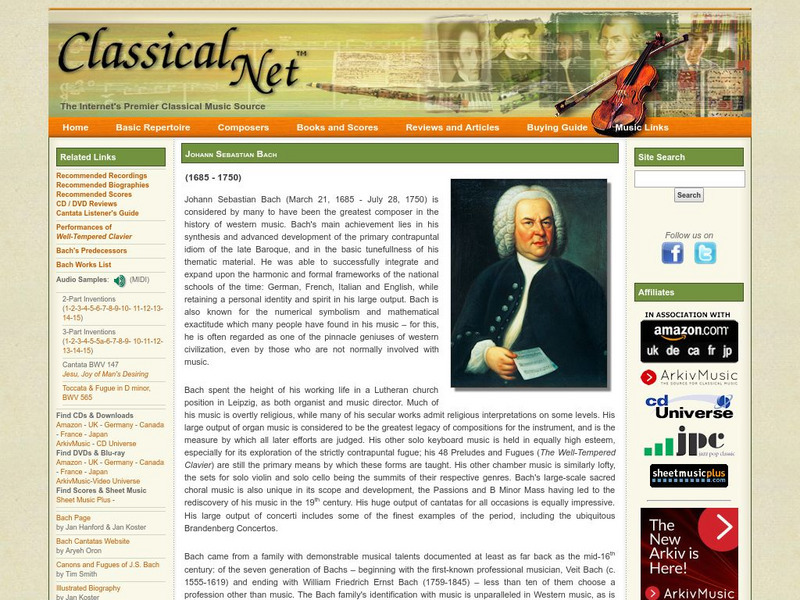University of Missouri
Famous Trials: Trial of Galileo Galilei
This chronicles Galileo's trial for supporting and proving the Copernican view of the solar system. A chronology, biographical information on key figures and pertinent historical documents are available.
Steven Kreis, PhD
The History Guide: The Enlightenment
A great essay on the Enlightenment period of the 18th century with hyperlinks to many individuals and movements of the time. A very scholarly look at the "age of enlightenment."
Art Institute of Chicago
Art Institute of Chicago: Art Access: Art of India: Lesson: Eightfold Path
Lesson plan for explaining the path to enlightenment known in Buddhism as the Eightfold Path.
PBS
Pbs Liberty!: Thomas Paine
Short biography of Revolutionary activist Thomas Paine. Includes historical illustration of Paine plus a video clip from the PBS documentary "Liberty."
Other
Seton Hall University: Toleration and Religious Liberty
This essay from the Seton Hall University describes the transition from intolerance of Catholics to religious liberty in America.
Other
Voltaire by Clarence Darrow
An extensive biography of Voltaire written by Clarence Darrow. Use links to view other material on Voltaire
University of Georgia
University of Georgia: Lexis Complexes: Restless Wrestling: Johnson's Rasselas
Discussion of Rasselas and how Johnson's personal experiences shaped the book.
Other
Inf Ed Encyclopedia: Jean Jaques Rousseau on Education
An extensive biography of Rousseau with lots of detail on his views on education, especially informal education.
Other
School Wires: The Commerical North [Pdf]
The Northern colonies developed a predominantly urban society, based on commerce and trade.
Other
Secular Humanism: Thomas Paine
The Secular Humanism site looks at Thomas Paine and his political philosophy based in deist thought.
Independence Hall Association
U.s. History: The Beginnings of Revolutionary Thinking
The American Revolution was close to 200 years in the making. Read about the philosophies and attitudes toward government, as well as the diverse populations who came to the British colonies, that eventually fomented rebellion.
Other
Bristol University: The Spirit of the Laws [Pdf]
This resource presents the complete text by the famous 18th century French economist (in English). In it, he advanced theories of democracy for the French monarchy. It is in PDF format and is a large file.
National Endowment for the Humanities
Neh: Edsit Ement: In Old Pompeii
Use this lesson plan to take learners on a virtual field trip to the ruins of Pompeii to explore everyday life, art and culture in ancient Roman times. Students will then use what they learned about the history and destruction of Pompeii...
Rutgers University
Rutgers University: Who Is This Johnson Guy?
Brief introduction to the life and impact of Samuel Johnson. Contains links to additional information.
iCivics
I Civics: John Locke Mini Lesson
Introduce learners to the ideas and writings of John Locke that influenced the likes of Thomas Jefferson and other Founding Fathers.
iCivics
I Civics: Rousseau Mini Lesson
Explore the ideas of Enlightenment thinker, Jean-Jacques Rousseau. His writings on natural and social freedom, the social contract, and democracy shaped the American system of government in a variety of ways.
British Library
British Library: Discovering Literature: Language and Ideas
From Johnson's Dictionary to letter-writing, newspapers and coffee-house culture: explore how different forms and mediums helped to develop and circulate language and ideas during the long 18th century.
British Library
British Library: Discovering Literature: Politics and Religion
The Civil Wars and the Restoration of the monarchy, the Enlightenment or 'Age of Reason', and British colonialism: investigate the political and religious contexts of Restoration and 18th-century literature.
Khan Academy
Khan Academy: The Stupa
Can a mound of dirt represent the Buddha, the path to Enlightenment, a mountain and the universe all at the same time? It can if it is a stupa. The stupa ("stupa" is Sanskrit for heap) is an important form of Buddhist architecture. View...
Khan Academy
Khan Academy: Borobudur
The idea of path is an important concept in Buddhism, and is essential in understanding the meaning and purpose of one of the most remarkable and impressive monuments in the world: Borobudur. View pictures and read the history behind...
Classical Net
Classical Net: Johann Sebastian Bach
This is a short biography of the legendary composer Johann Sebastian Bach. This site has many links to other topics about Bach.
Curated OER
Macmillan/mc Graw Hill: The World, Vol. 1: Changing Ideas: Lesson 5 Quiz
Choose the correct answer for each of the five multiple choice questions in this self-check quiz to evaluate your comprehension of rebellion in the Age of Imperialism.
Other
Wikipedia: Simple English Wikipedia: Buddhism
An easy-to-read entry on Buddhism, from open-source encyclopedia Wikipedia, that answers basic questions about the religion and its practices. Explains the Buddhist belief system and what the word "Buddha" means. Also discusses Buddhist...
Tom Richey
Slide Share: The Commerical North
This slideshow shows the factors that caused Northern states to be industrial. These factors include the Enlightenment and the Second Great Awakening.















